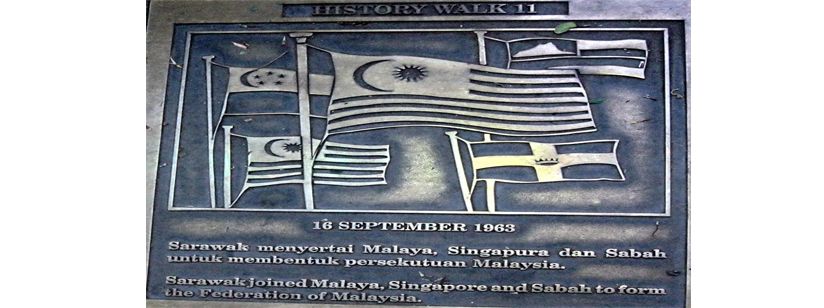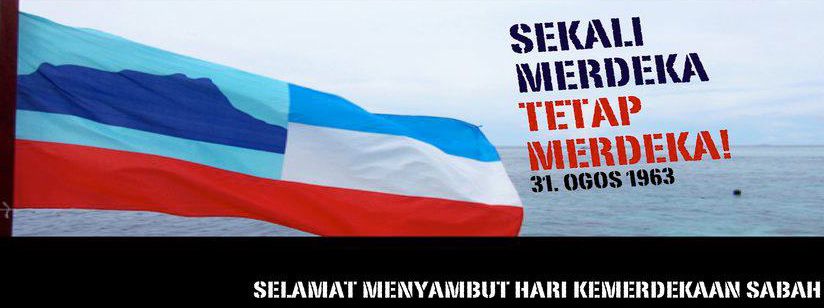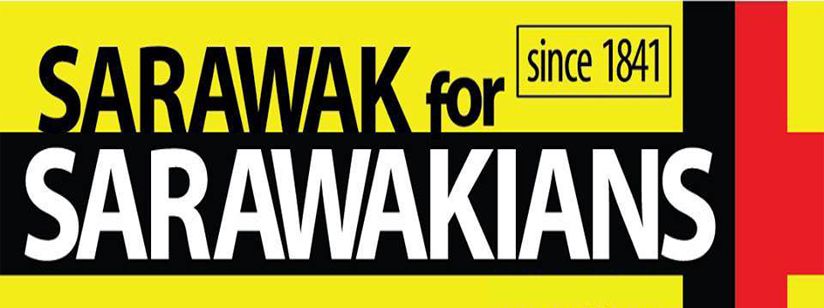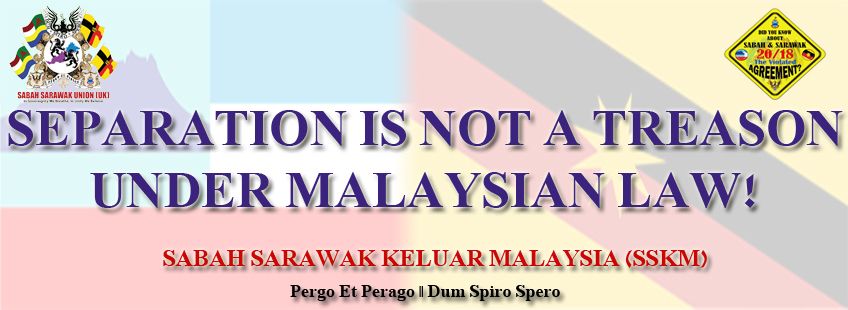Monday, 2 February 2015
Monday, February 02, 2015
malaya
,
News
,
Sabah
,
Sabah Sarawak Union (SSU)
,
Sarawak
,
Sharing
No comments
The Silence of Mainstream Media in West Malaysia
All newspapers in Borneo have released the news on the SSKM members being detained in Tuaran Police Station yesterday.
But in West Malaysia everything's quite...
This is why people in West Malaysia will never know the feelings and the issues that effect the people of Borneo other then if they open online news...
But for now the mainstream media at West Malaysia either print, TV or radio are going to stay deaf.
Monday, February 02, 2015
Nationalist
,
NWS
,
Sabah
,
Sabah Sarawak Union (SSU)
,
Sarawak
No comments
"Nations Without States totally condemns Malaysia (malaya) towards the remanded"
Nations without States totally condemns the remanded yesterday of, and now on bail, nine Sabah activists under the umbrella of Sabah Sarawak Union (UK). Their only crime it seems is for attempting to raise signatures for a petition calling upon Malaysia (read malaya ) to put back their rights and wealth they are extracting from the country (Sabah). Malayan authorities (where the central power resides) clearly do not like their policies to be criticised, especially within the nations they control. Whilst they might like to act like a dictatorship they are a part of the Commonwealth which is supposed to promote freedom of expression. Either, Malaysia must leave that body or the Commonwealth must act against them.
Serve the Nations for Self Determination :
Graham Williamon (Director)
Doris Jones ( Comittee & Diaspora for North Borneo)
Right to self-determination
While there is no universally accepted agreement as to the content of the right to self-determination, it is agreed that at a minimum, it entails the entitlement of peoples to have control over their destiny and to be treated respectfully. This includes peoples being free to pursue their economic, social and cultural development.
Where does the right to self-determination come from?
Australia is a party to seven core international human rights treaties. The right to self-determination is contained in article 1 of the International Covenant on Civil and Political Rights (ICCPR) and article 1 of the International Covenant on Economic, Social and Cultural Rights.
This right is also contained in Article 3 of the Declaration on the Rights of Indigenous Peoples . The Declaration does not create legally binding obligations, but informs the way governments engage with and protect the rights of Indigenous people.
When do I need to consider the right to self-determination?
Self-determination is a right that pertains to groups of people, not individuals. In Australia, it is particularly relevant to Aboriginal and Torres Strait Islander peoples.
You will need to consider the right whenever you are working on legislation, a policy or a program that will have a particular impact on Aboriginal and Torres Strait Islander peoples or other peoples with a common racial, ethnic or cultural identity which has been built up over a long period of time. The people impacted should be closely involved in the development and implementation of policies and programs that impact on them and with consultation and engagement strategies that facilitate this. The establishment of the National Congress of Australia's First Peoples is a leading example of this.
What is the scope of the right to self-determination?
It is generally understood that the right to self-determination accrues to 'peoples'. The UN Human Rights Committee has declined to consider individual complaints about the right under the First Optional Protocol to the International Covenant on Civil and Political Rights (ICCPR).
The UN Committee on the Elimination of Racial Discrimination has stated that the right to self-determination involves 'the rights of all peoples to pursue freely their economic, social and cultural development without outside interference' and that 'Governments are to represent the whole population without distinction as to race, colour, descent or national or ethnic origin'.
The Australian Government believes that individuals and groups, particularly Aboriginal and Torres Strait Islander peoples, should be consulted about decisions likely to impact on them. This includes ensuring that they have the opportunity to participate in the making of such decisions through the processes of democratic government, and are able to exercise meaningful control over their affairs.
Aboriginal and Torres Strait Islander peoples also have the right to preserve their group identity and culture. The importance of consultation is manifested in the establishment of the National Congress of Australia's First Peoples.
Self-determination is widely understood to be exercised in a manner that preserves the territorial integrity, political unity and sovereignty of a country.
Declaration on the Rights of Indigenous Peoples
The international community has recognised the significance of the right to self-determination to Indigenous peoples in the Declaration on the Rights of Indigenous Peoples, which was supported by the Australian Government in April 2009. In Australia's response to the Universal Periodic Review recommendations in June 2011, the Australian Government stated that it supports promotion of and respect for the principles in the Declaration.
The Declaration is not binding in international law, in the way that a treaty binds countries that are party to it. However, the Declaration reflects how a number of existing human rights standards under international law apply to the particular situation of Indigenous peoples.
Can the right to self-determination be limited?
Derogation
Under article 4 of the ICCPR, countries may take measures derogating from certain of their obligations under the Covenant, 'in time of public emergency which threatens the life of the nation and the existence of which is officially proclaimed'. Such measures may only be taken 'to the extent strictly required by the exigencies of the situation, provided that such measures are not inconsistent with their other obligations under international law and do not involve discrimination solely on the ground of race, colour, sex, language, religion or social origin.' While derogation to article 1 is not explicitly precluded, such derogation may be inconsistent with Australia's 'other obligations under international law', given that article 1 of the Charter of the United Nations refers to 'the principle of equal rights and self-determination of peoples' when enumerating the purposes of the UN.
Limitation
For the same reason, it would be difficult to justify any restriction on the right to self-determination in the ICESCR.
Which domestic laws relate to the right to self-determination?
Section 3 of the Aboriginal and Torres Strait Islander Act 2005 states that the objects of the Act include to ensure the maximum participation of Aboriginal persons and Torres Strait Islanders in the formulation and implementation of government policies that affect them and to promote the development of self-management and self-sufficiency among Aboriginal and Torres Strait Islander peoples.
What other rights and freedoms relate to the right to self-determination?
The right to self-determination may also be relevant to:
- right to take part in the conduct of public affairs in article 25 of the ICCPR
- rights of ethnic, religious or linguistic minorities to enjoy their own culture, religion and language in article 27 of the ICCPR
- right to be free from all forms of racial discrimination in articles 2 and 5 of CERD.
Articles from relevant Conventions
International Covenant on Civil and Political Rights
Article 1
International Covenant on Economic, Social and Cultural Rights
Article 1
- All peoples have the right of self-determination. By virtue of that right they freely determine their political status and freely pursue their economic, social and cultural development.
- All peoples may, for their own ends, freely dispose of their natural wealth and resources without prejudice to any obligations arising out of international economic co-operation, based upon the principle of mutual benefit, and international law. In no case may a people be deprived of its own means of subsistence.
- The States Parties to the present Covenant, including those having responsibility for the administration of Non-Self-Governing and Trust Territories, shall promote the realization of the right of self-determination, and shall respect that right, in conformity with the provisions of the Charter of the United Nations.
Where can I read more about the right to self-determination?
- United Nations, Office of the High Commissioner for Human Rights, Human Rights Bodies (human rights treaty bodies that monitor implementation of the core international human rights treaties)
- UN Declaration on the Rights of Indigenous Peoples (in particular articles 3, 4 and 46).
- UN General Assembly Resolution 2625 of 24.10.1970 (Declaration on Principles of International Law Concerning Friendly Relations and Cooperation Among States In Accordance With the Charter of the United Nations)
- UN Committee on the Elimination of Racial Discrimination General Recommendation No 21
- UN Committee on the Elimination of Racial Discrimination General Recommendation No 23
- UN Human Rights Committee General Comment No 23 (on the rights of minorities under the ICCPR)
- UN Special Rapporteur on the Rights of Indigenous Peoples, Report to the UN Human Rights Council, A/HRC/15/37/Add.4, 1 June 2010
- Australian Human Rights Commission Community Guide to the Declaration on the Rights of Indigenous Peoples
Cops question nine on secession issue
Sabah police say the individuals were distributing pamphlets calling for the secession of Sabah and Sarawak from Malaysia.
KOTA KINABALU: Police have recorded the statements of nine individuals, three of them women, regarding the distribution of pamphlets calling for the secession of Sabah and Sarawak from the country in Tuaran last night.
Sabah Police Commissioner Jalauddin Abdul Rahman said besides the statements of the nine suspects aged between 24 and 52, police also took statements from 14 witnesses related to the incident.
“The nine arrests were made under Section 4(1) of the Sedition Act. All nine suspects were released on bail yesterday (February 1), at 5pm, after the statements were recorded,” he told Bernama.
According to Jalaluddin, the investigations will also be done under the Printing Presses and Publications Act, and would be completed as soon as possible to be handed over to the Public Prosecutor for further action.
Jalaluddin said the nine suspects were arrested between 9.50am and 10.42am yesterday, after they were believed to be distributing pamphlets in various locations at the Tuaran weekly market.
He said following the arrests, some 113 reading materials of various topics were seized from the suspects to assist investigations.
According to Jalaluddin, among the titles of the reading materials were ‘Questions for Us All as Indigenous People of Sabah and Sarawak’, ‘Peoples Petition to United Nations to Re-open the Issue of Self-Determination for Sabah and Sarawak’, ‘The People of Sabah (North Borneo) & Sarawak Borneo’, ‘Sabah Sarawak March for Independence’, and ‘Call for Sabah and Sarawak’s Rights’.
Other reading materials seized were ‘Agreement Concluded Between The United Kingdom of Great Britain and Northern Ireland’, ‘The Federation of Malaya’, ‘North Borneo, Sarawak and Singapore’, he said.
Polis Sabah rakam percakapan suspek berkaitan risalah SSKM
KOTA KINABALU: Polis Sabah sudah merakamkan percakapan sembilan suspek termasuk tiga wanita, berhubung pengedaran risalah Sabah Sarawak Keluar Malaysia (SSKM) di Tuaran, semalam.
Pesuruhjaya Polis Sabah, Datuk Jalaluddin Abdul Rahman berkata selain percakapan sembilan suspek berumur 24 hingga 52 tahun itu, pihaknya turut merekodkan keterangan 14 orang saksi.
"Tangkapan sembilan suspek dibuat di bawah Seksyen 4(1) Akta Hasutan. Kesemua sembilan suspek telah dibebaskan dengan jaminan polis pada 5 petang semalam selepas rakaman percakapan diambil," katanya kepada Bernama di sini hari ini.
Jalaluddin berkata siasatan juga akan dijalankan di bawah Akta Mesin Cetak dan siasatan kes itu akan disiapkan secepat mungkin untuk diserahkan kepada pihak Pendakwa Raya bagi arahan lanjut.
Beliau berkata sembilan suspek itu ditahan selepas disyaki mengedarkan risalah berkaitan SSKM di beberapa lokasi di tamu (pasar minggu) Tuaran antara pukul 9.50 pagi dan 10.42 pagi semalam.
Katanya berikutan tangkapan itu, sebanyak 113 risalah pelbagai tajuk dan beberapa buah buku turut dirampas daripada suspek untuk membantu siasatan.
IGP warns separatists: Wait for my action
Sabah and Sarawak police have been ordered not to tolerate any violation of the Constitution.
PUTRAJAYA: Inspector-General of Polis Khalid Abu Bakar today issued a stern warning to those agitating for Sabah’s and Sarawak’s separation from Malaysia, saying it amounted to treason.
“Let me say this to those inciting the people to support the move to take Sabah and Sarawak out of Malaysia: just wait for my action,” he told reporters covering the launch of the police football tournament for 2015.
He said he had given strict directives to Sabah and Sawarak police against tolerating any violation of the Federal Constitution.
“The Royal Malaysian Police will not let it happen,” he said of the separatist moves.
Yesterday, Sabah police arrested nine people suspected of distributing separatist literature. They were detained under the Sedition Act but were released after their statements were recorded.
Sabah Police Commissioner Jalaluddin Abdul Rahman said police also recorded statements from 14 witnesses.
Monday, February 02, 2015
Agreement of Malaysia
,
Exposing the Truth
,
Fact
,
Federation of Malaysia 16 September 1963
,
Sabah
,
Sarawak
No comments
Sabah Seeking Restoration Of Legitimate Rights, Privileges And Not Secession – Jeffrey K
KOTA KINABALU: Leaders from Malaya and their Sabah representatives should stop deceiving the people of Sabah and Sarawak by claiming that calls for secession is seditious and against the Constitution.
Saying this is to prevent Sabah and Sarawak from leaving the Federation of Malaysia, STAR Sabah chief Datuk Dr. Jeffrey Kitingan referred to the Singapore pull-out in 1965.
“If secession is seditious and or against the Constitution, why was it Singapore was allowed to secede barely two years after the formation? Shouldn’t the Singapore leaders then be charged for sedition if it was seditious?” he asked.
He pointed out that not only did the federal government allow Singapore to leave the federation, they even signed the “agreement of separation” with Singapore before the motion to approve the departure was tabled in Parliament on 9th August 1965.
“The federal Parliament was merely asked to endorse and rubber-stamp the departure.
“Obviously, they were not charged and Singapore was allowed to go separate ways because as said by Lord Lansdowne, Chairman of the IGC: “… any State voluntarily entering a federation had an intrinsic right to secede at will, and that it was, therefore, unnecessary to include it in the Constitution.”
“Nowhere is it stated in the Federal Constitution that Sabah and Sarawak are not allowed to secede,” said Dr Jeffrey.
He pointed out that the people of Sabah and Sarawak know for a fact that Sabah and Sarawak were taken for a ride and cheated outright in the formation of Malaysia.
“They also know that Malaya needs Sabah and Sarawak more than the other way round and without the two State’s oil wealth, Malaya and Malaysia would go bankrupt well before 2019 given its current national debt of about RM700 billion,” he added.
Responding to PKR de facto leader Datuk Seri Anwar Ibrahim’s claim during an interview with the media here over the weekend, that the Federal Constitution does not allow for secession, Dr Jeffrey who is also Bingkor Assemblyman contended that Pakatan leaders should not be following in Barisan Nasional (BN) leaders’ footsteps.
“If they wish to have a good chance of taking over Putrajaya in the next general elections, they would need the support of Sabah and Sarawak to achieve this.
“Instead of following the Umno BN dictatorial regime, a diplomatic and consultative approach would be a better option to persuade Sabahans and Sarawakians to remain in the Federation,” he contended.
Dr Jeffrey reiterated that Sabah and Sarawak nationalists and activists are not seeking secession but restoration of the legitimate rights, privileges and autonomy of the Borneo States that were taken away or eroded since 1963.
Anwar’s ‘No Secession’ plea misleading
The Opposition Leader avoided mentioning the intention of the Founding Fathers in Borneo and Article 1 of the Malaysia Agreement 1963.
KOTA KINABALU: Opposition Leader Anwar Ibrahim’s take on Friday in Kota Kinabalu on the unhappiness in Sabah and Sarawak with Malaysia was not about “the truth being stranger than fiction” but vice versa.
That’s the stand taken by the UK-based Borneo’s Plight in Malaysia Foundation (Bopim).
“Anwar claimed during a session with the local media that the Federal Constitution does not allow for secession,” noted Bopim President Daniel John Jambun in a phone call. “If this was the case, Attorney General Abdul Gani Patail would have mentioned it during the recent Opening of the Sabah, Sarawak Law Year in Kota Kinabalu.”
“Instead, the AG referred to Point 7 of Sabah’s 20 Points, a constitutional document on Malaysia, which states that ‘there would be no secession’ from Malaysia.”
The AG did concede nevertheless, pointed out Daniel that — presumably notwithstanding Point 7 — the people can decide (on secession).”
Two points must be mentioned on secession, stressed Daniel, besides the AG literally advocating but not as a Sabahan that “the people can decide (to secede)”.
The first is that “the Bible states that God made man in his own image and with Free Will. The concept of Free Will allows for the kind of self-determination that facilitates secession”.
Secondly, stated Daniel, Article 1 of the Malaysia Agreement 1963 (MA63) was never implemented. Article 1 called for a new Federation, called Malaysia, as An Equal Partnership of Sabah, Sarawak and Malaya (with Singapore incorporated through merger with the peninsula), and a new Malaysian Constitution.
Both — new Federation, new Constitution — were never done in 1963.
“The present Malaysia is, in fact and in law, the Federation of Malaya based on the Federation of Malaya Agreement 1948. The definition of Federation under Article 160 of the Federal Constitution refers.”
Article 1(1) of the Federal Constitution, continued Daniel, clearly shows that Sabah and Sarawak were dragged into the Federation of Malaya (known as Federation of Malaysia since August 31, 1963 and/or September 16, 1963) as the 12th and 13th states.”
“This was not the intention of the Founding Fathers in Borneo and was not in line with the intention of the framers of Article 1 of MA63.”
Where both Anwar and the AG seem to agree, said Daniel, was that “a minority was driving the Agenda on Sabah, Sarawak rights.”
“We beg to disagree with both gentlemen on the struggle for Sabah, Sarawak rights being one waged by a minority,” said Daniel. “The Sabah, Sarawak struggle for their rights could not be the Agenda of a minority after a half century of the plight of both nations in Malaysia. After these more than five decades, everyone in Borneo is aware that something is not quite right about Sabah and Sarawak in Malaysia.”
The bottomline, said Daniel, is that Malaysia as per Article 1 of MA63 has no legitimacy in Borneo. “The Federal Government has also been party to illegalities in Borneo, especially in Sabah, as evident from the Royal Commission of Inquiry (RCI) Report released in December last year.”
States are of course integral to a Federation as Anwar pointed out, said Daniel, “but that doesn’t mean no secession”.
Singapore had to leave Malaysia in 1965 after it realised that it’s merger with Malaya would still not give it access to the Malaysian Common Market, he recalled.
“No Common Market, NO Malaysia, Singapore decided.”
Likewise, Daniel reiterated that Sabah and Sarawak being the 12th and 13th states in Malaya (renamed Malaysia) was not the “intention” of the Founding Fathers in Borneo, nor was it in line with Article 1 of MA63.
“No Equal Partnership of Sabah, Sarawak and Malaya, NO Malaysia. Sabah and Sarawak can decide.”
Monday, February 02, 2015
Nationalist
,
News
,
Sabah
,
Sabah Sarawak Union (SSU)
,
Sarawak
,
SSKM
No comments
TUARAN TAMU SAGA: Nine Arrested For Distributing ‘seditious’ Leaflets At Tamu; Released Nine Hours Later
TUARAN: Nine locals, most of them said to be from Ranau, were picked up at the Tamu grounds Sunday morning for allegedly being involved in activities of a seditious nature.
Three others, who were said to have been signatories to a petition promoting Sabah rights being carried out by the group, were also hauled up by police, according to witnesses, but there was no mention of them at a press conference later on.
All nine, aged from 24 to 50, three of them women, were released nine hours later after their statements were taken down and after they posted an un-deposited police bail of RM2,000, with two sureties.
Their arrests at about 9.15 am caught the attention of local opposition politicians, including former Chief Minister, Datuk Yong Teck Lee, who rushed to the police station to offer legal and moral assistance.
They were however locked out as the gates were closed while a light strike force (LSR) unit stood by some 10 metres away.
This caused some tension at the scene as Yong clamored that he and some lawyers be allowed to visit the detainees so that they could be offered legal advice.
A senior police officer, identified as ASP Solihin however said no one was to be allowed in, though he later (at about 5pm) allowed 18 people, said to be friends of the detainees, to enter so they could post bail.
As catcalls were raised, the group then unfurled two Sabah flags and sang the ‘Sabah Tanah Airku’ (Sabah My Homeland) state anthem.
Later former deputy Labour Minister and Tuaran MP, Datuk Kalakau Untol and former Petagas Assemblyman, Datuk James Ligunjang were also seen outside the police gates.
Most of those detained were wearing their traditional costumes but there were some who had t-shirts on with the words SSPR (said to refer to Semangat Satu Perjuangan Rakyat) or In One Spirit for the Peoples’ Rights.
Witnesses told Sabahkini.com that the nine were part of a larger group who had planned to collect signatures for a petition on Sabahan rights as well as distribute leaflets at the tamu outlining their struggles.
They said police suddenly swooped down on the nine, plus three others who had signed the petition, and ‘handcuffed’ them with plastic cuffs, before taking them to the police station nearby.
The others who escaped the police dragnet soon started flooding social media with photos of their ‘handcuffed’ comrades as well as their arrests.
This got the attention of Yong, who with several of his SAPP members went to the station at about 3.00pm only to find themselves denied entry.
The detainees were finally released at 6.15pm and marched out with their bailors; and on reaching the police gates heartily sang the Sabah Tanah Airku.
Leaders were carried shoulder high as they celebrated their release.
Sabah Officer in Charge of Criminal Investigations (OCCI) Senior Assistant Commissioner, Sallehudin Abdul Rahman when met at about 8.10pm at the station, confirmed that police believe those detained had connections with SSKM (Sabah Sarawak Keluar Malaysia or Sabah Sarawak Secede from Malaysia).
He said those detained were being investigated under the Sedition Act for indulging in activities that were seditious in nature. He did not elaborate though.
Sallehudin said police had yet to complete their investigations and once it was over, a report would be handed over to the Attorney-General’s chambers for further action.
Inspector General of Police Tan Sri Khalid Abu Bakar in his twitter account on Sunday night said:
“Well done @Sabah police arrest nine individuals in Tuaran for distributing brochures instigating the people to get Sabah out of Malaysia. WELLDONE Boys,” he said.
He, however, declined to comment further when contacted by Bernama.
It is understood that police have retained the handphones of those detained, telling them they were required for police investigations.



































































